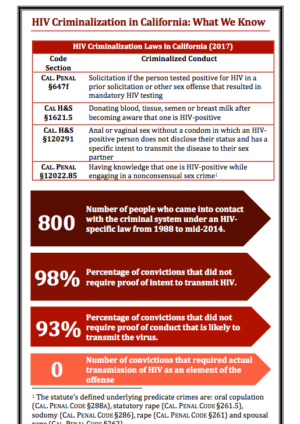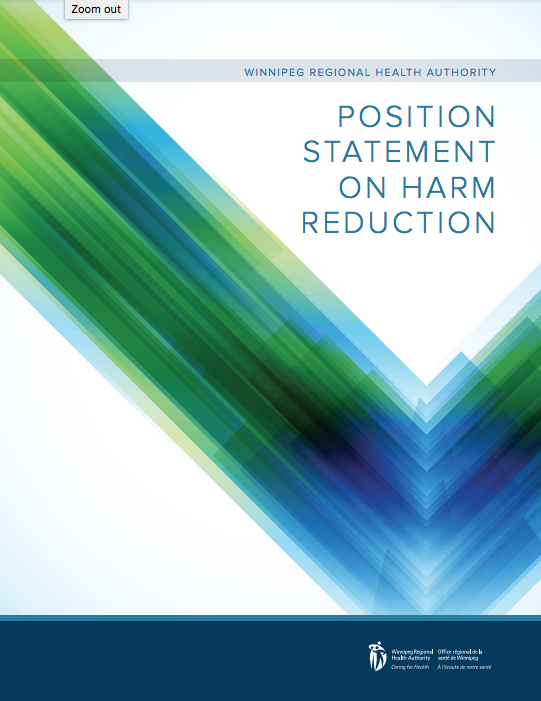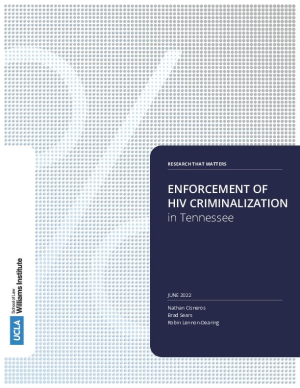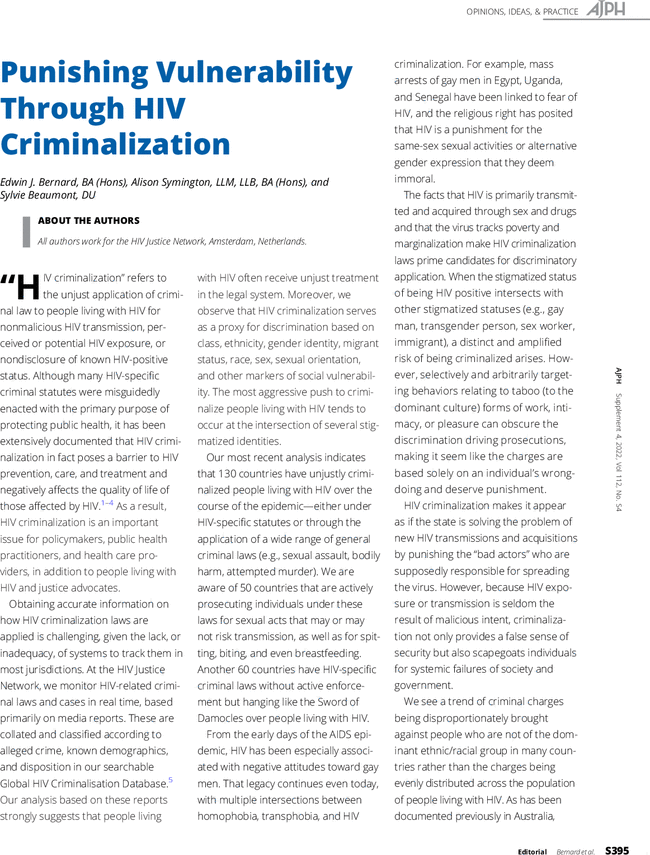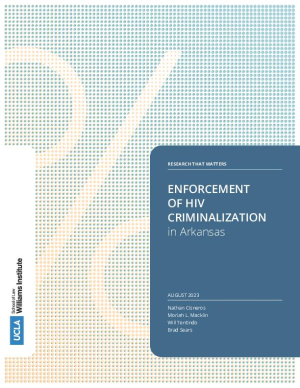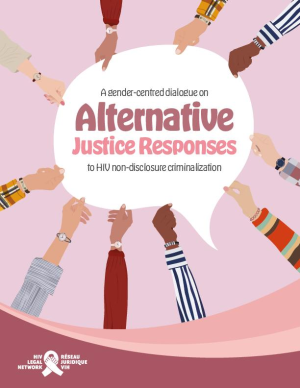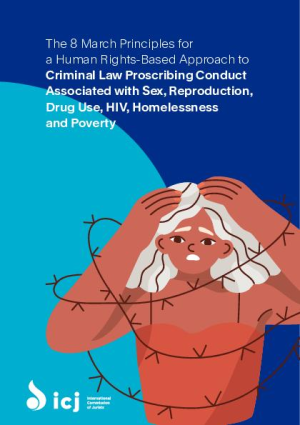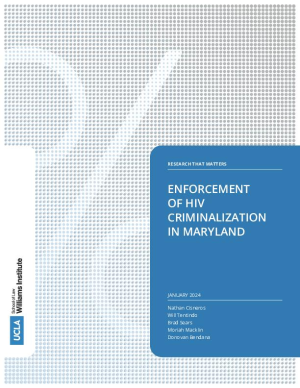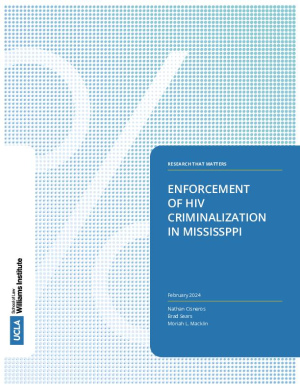Found uneven application of HIV criminalization laws in the state of Michigan, with black men and white women having a comparatively greater risk of conviction than white men or black women. White women had the highest conviction rate of any group analysed, suggesting they may face a particular burden under these laws. Many of the white women convicted were especially disadvantaged by issues such as poor mental health, substance abuse and homelessness.
Intersectionality
Disparities in the enforcement of HIV criminalisation on the basis of race or gender
HIV Criminalization in California: What We Know
Highlights significant findings about Californian criminal law including that more than 800 people have come in contact with California’s criminal system based on their HIV status, with 93% of convictions requiring no proof of conduct likely to transmit HIV. Also finds HIV criminal statutes are disparately enforced based on race/ethnicity, sexuality and gender.
Position Statement on Harm Reduction
Acknowledges the harms caused by stigma and criminalisation. In particular, it acknowledges that the harms of criminalisation are borne disproportionally by Indigenous peoples in Canada. The Statement recognises that while people make their own health decisions, these decisions are only one factor influencing health outcomes.
- Alternative links
- French/Français
HIV Criminalization in Florida – Penal Implications for People Living with HIV/AIDS
Provides an overall understanding of the enforcement of HIV criminalization laws in Florida and assesses any preliminary findings indicating disparities between subpopulations. Preliminary analyses found that there is evidence of disparities in enforcement of HIV criminalization laws related to geography, race/ethnicity, sex at birth, or sex worker (or suspected sex worker) status and underlying related offenses.
HIV Criminalization in Georgia: Penal Implications for People Living with HIV/AIDS
Analyses how HIV criminalisation laws in Georgia have been utilised and assesses preliminary findings on disparities between sub-populations. Found that there might be disparities in enforcement of HIV Criminalisation laws related to geography, race/ethnicity, sex at birth or sex worker (or suspected sex worker) status.
Through our eyes
Photo essay drawing on photographs and narratives created as part of an ongoing community-based photo-voice project visually exploring the gendered dimensions of HIV stigma, disclosure, and criminalization among diverse groups of women and transgender people living with HIV in Vancouver, Canada
Enforcement of HIV Criminalization in Tennessee
Williams Institute analysis of data from the state of Tennessee about individuals who were convicted of an HIV crime and placed on the state’s sex offender registry (SOR). In addition to the registry data, the report also analyses detailed data from 77 case files of those on Tennessee’s SOR who resided and were prosecuted in Shelby County, home of Memphis.
Punishing Vulnerability Through HIV Criminalization (2022)
This article explores the links between HIV criminalisation and other punitive laws and policies that regulate bodily autonomy, including reproduction, sexuality and gender.
Enforcement of HIV Criminalization in Arkansas
Using data obtained from the Arkansas Crime Information Center and the Information Network of Arkansas, this study examines the enforcement of HIV criminalization laws in Arkansas since 1989. It found that HIV-related crimes in Arkansas are disproportionately enforced based on race and sex and impact Black men the most.
A gender-centred dialogue on alternative justice responses to HIV non-disclosure criminalization
This report represents a synthesis of cross-sector discussions during a roundtable about alternative justice responses to the criminalization of HIV non-disclosure in Canada, as well as findings from the research and previous community engagement.
- Alternative links
- Français
8 March Principles for a Human Rights-Based Approach to Criminal Law Proscribing Conduct Associated with Sex, Reproduction, Drug Use, HIV, Homelessness and Poverty
The Principles, published by the International Commission of Jurists are based on general principles of criminal law and international human rights law and standards. They seek to offer a clear, accessible and workable legal framework – as well as practical legal guidance – on applying the criminal law to conduct associated with: sexual and reproductive health and rights, consensual sexual activities, gender identity and expression, HIV non-disclosure, exposure or transmission, drug use and homelessness and poverty. The principles are additionally intended to address the detrimental impact of the criminalization of this conduct on health, equality and other human rights.
Enforcement of HIV Criminalization in Maryland
Using data obtained from the Maryland State Administrative Office of the Courts, this study from The Williams Institute examines the enforcement of HIV criminalization laws in Maryland.
Highlights:
- Nearly two-thirds of U.S. states and territories have laws that criminalize people living with HIV.
- Black people, especially Black men, are overrepresented in HIV-related crimes in Maryland.
- Over two-thirds of people charged with HIV-related crimes were charged in Baltimore City, Montgomery County, or Prince George's County.
Enforcement of HIV Criminalization in Mississippi
The Williams Institute analyzed data from the state of Mississippi about individuals arrested for an allegation of an HIV-related offense under Section 92-27-14 of the Mississippi Criminal Code. The study revealed at least 43 people arrested between 2004 and 2021.

